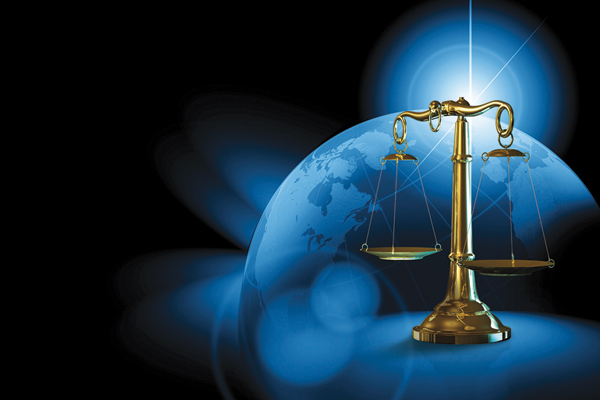The relationship between international law and the State of Palestine has plagued the legal world for nearly a century. A new chapter of this relationship opened, with all associated opportunities and challenges, when Palestine was granted non-member Observer State Status in the United Nations in accordance with UN General Assembly Resolution 67/19 in 2012, allowing it to join international treaties.
Riding on the euphoria of this event, the State of Palestine immediately signed 55 international treaties and conventions in early 2014. Seven of these are human rights treaties regulating the rights of social minorities and the underprivileged; others interface more broadly between the citizen and the state.
The State of Palestine’s signature of these conventions is extremely significant. For once, the act underpins the Palestinian state’s commitment to espouse international values relative to human rights as a member of the international community. Furthermore, the conventions provide both opportunity and obligation for Palestinian law, justice, and security practices to be formally amended in order to ensure that human rights are respected. The State of Palestine’s embrace of international law, as a strategy to improve the protection of its citizens, will promote trust and confidence, and enhance the State of Palestine’s reputation both at home and abroad. To this effect, however, some urgent, practical steps need to be taken in order to align national legislation with international treaties, as it has already been three years since this commitment was undertaken.
A selection of the conventions signed by the State
of Palestine in 2014ICCPR: International Convention on Civil and Political Rights
ICESCR: International Convention on Economic, Social and
Cultural RightsCEDAW: Convention on the Elimination of Discrimination
against WomenCERD: Convention on the Elimination of Racial Discrimination
CRC: Convention on the Rights of the Child
CAT: Convention against Torture (CAT)
CRPD: Convention on the Rights of Persons with Disabilities
Most scholars agree that the relationship between international treaties and domestic law is regulated by specific constitutional rules. In general, the question revolves around whether domestic law should be part of a single system of law, or whether international law and domestic law should be independent of one another. The majority of Palestinian legal scholars espouse the latter interpretation, holding the opinion that international and domestic law are two independent legal orders. But this matter has not yet been entirely clarified.
The Palestinian Basic Law, the backbone of the Palestinian legal system, attempts to enshrine international standards and facilitate the State of Palestine’s accession to regional and international conventions and treaties. It was promulgated in 2002 with the intention of ending the occupation and building a democratic state. With respect to human rights in particular, article 10(2) of the Palestinian Basic Law provides that the state “shall work without delay to become a party to regional and international declarations and covenants that protect human rights.” Unfortunately, it does not go further to indicate the status of international law in case of contradictions with national legislation. This raises the question as to how to best reconcile the Palestinian legal system with the obligations that have been imposed by the State of Palestine’s joining of international treaties, particularly with regard to the treaties pertaining to human rights. The solution to this problem lies in one of the following scenarios.
Scenario 1 – harmonize domestic legislation with the international treaties to which the State of Palestine is a party.
Scenario 2 – provide for the national judicial system to implement international treaty provisions by invoking international law in judgments.
Scenario 3 – incorporate new articles within the draft constitution in order to delineate the status of international treaties.
The actual concern regarding Scenario 1 pertains to the consistency between the Palestinian Basic Law and international treaties. In cases when international treaties should contradict Basic Law, e.g., constitutional articles, the lack of a proper reference could lead to the exclusion of international treaties from the domestic legal order. Yet, according to Article 27 of the Vienna Convention on the Law of Treaties, to which the State of Palestine is a party, states cannot invoke domestic law as a justification for failure to comply with treaty obligations. The State of Palestine has the obligation to observe the application of the treaty and must report on the vitality of this application. Since the Palestinian Legislative Council is not active, the responsibility for issuing laws falls on the Palestinian president; upon issuing, these laws are to be promulgated and published in the Official Gazette.* Unfortunately, however, and perhaps owing to a lack of certainty on the issue, the treaties that the State of Palestine has joined have not been published in the Palestinian Official Gazette.

In the absence of such publication, it is not entirely clear whether judges may directly apply these treaties, or whether they should refer back to customary international law. Customary international law is the body of law that is reflective of a general practice of states and determines the rules that states have accepted as law (for example, the right to freedom from torture is a customary international law to which states are bound, regardless of whether they have joined the Convention against Torture).
Ideally, through the judiciary of any state, judges can point out contradictions between domestic and international law for the purpose of providing the legislature a means of ensuring that domestic laws meet international standards. Without publication in the Official Gazette, however, judges cannot invoke treaties as a source of law. Hence Scenario 2 becomes more difficult.
The newly formed Palestinian Constitutional Court may play a key role in interpreting the provisions of and setting straight the relationship between the Basic Law and international treaties to which the State of Palestine is a party, in line with the Vienna Convention on the Law of Treaties. Furthermore, a strong recommendation has been voiced to incorporate new articles within the draft constitution in order to delineate the status of international treaties with respect to their domestic application. This would mend the current situation in accordance with Scenario 3, providing for specific articles in the constitution on international law and treaties.
The current situation poses a clear problem that needs to be fixed. Until otherwise specified, Palestinian Basic Law prevails over the Vienna Convention on the domestic front. Efforts have been made by the Palestinian government, the Birzeit University Institute of Law, and other Palestinian civil society organizations to harmonize Palestinian domestic law and the international treaties to which the State of Palestine is a party. Such efforts must continue in the interest of the Palestinian people.
» Ghassan Faramand holds a PhD and is a founder and former director of the Institute of Law at Birzeit University. He is a lawyer and a lecturer at Birzeit University.
» Ata Hindi is a research fellow in international law at the Institute of Law at Birzeit University.
» Johan Schaar holds a PhD from the Swedish University of Agricultural Sciences. Since mid-2013, he has been the Head of Development Cooperation at the Swedish Consulate General in Jerusalem, which manages Swedish development support to Palestine.
……………………………………….
* As per Article 41(1) of the Palestinian Basic Law.



